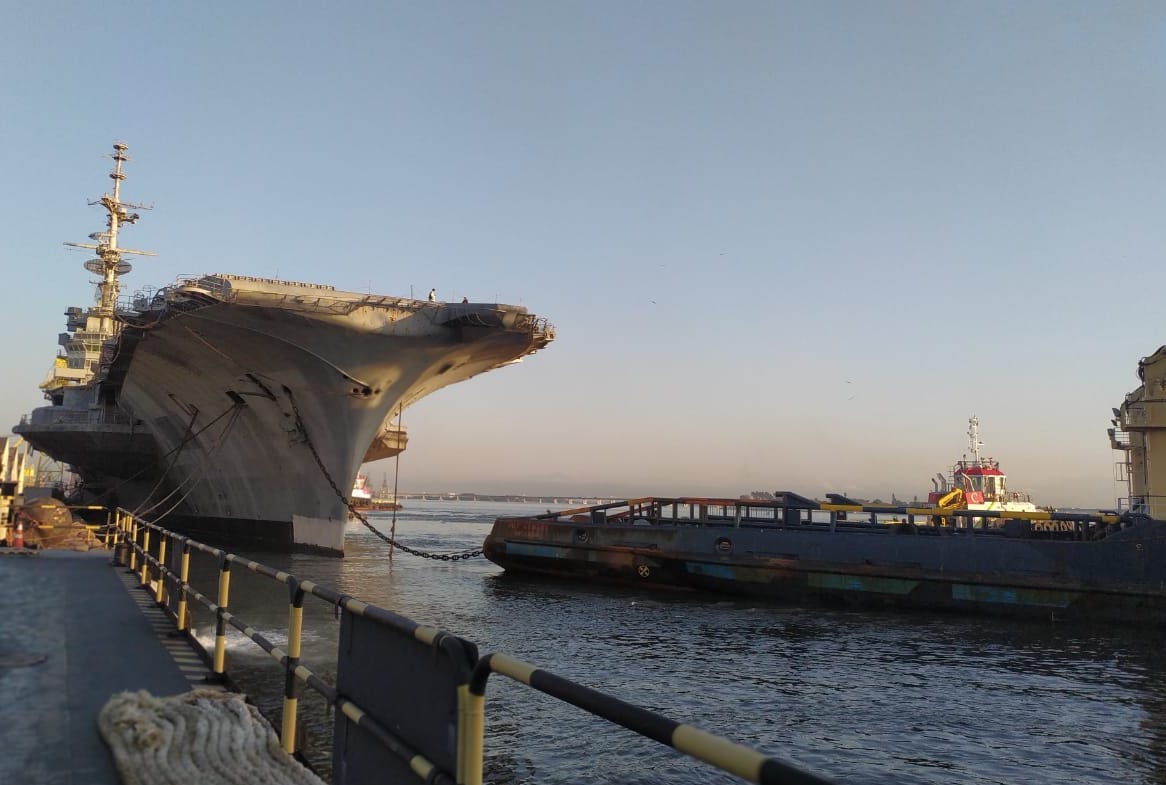Press Release – Toxic warship “Clemenceau II” starts voyage from Brazil to the Mediterranean Sea
In violation of Basel and Barcelona Conventions -- NGOs call on President Macron to take responsibility for old French aircraft carrier
Reports from Rio de Janeiro, Brazil confirm that the sister ship of the infamous aircraft carrier CLEMENCEAU, formerly known as French warship FOCH, and most recently named the SÃO PAULO, has now been placed under tow on an about 6000-mile journey to Aliaga, Turkey, where it is to be scrapped. Environmental groups around the world are denouncing Brazil’s export and disposal plans in Turkey as illegal and unsafe.
History repeating itself
The NGO Shipbreaking Platform, Basel Action Network (BAN), BAN Asbestos France, Henri Pézerat Association (Work, Health, Environment), International Ban Asbestos Secretariat (IBAS), İstanbul Isig Meclisi, Brazilian ABREA and Greenpeace Mediterranean have called upon President Macron to take responsibility for the ship and direct it to safe and legal recycling or reuse, as France did with the sister carrier the CLEMENCEAU in 2006. At that time, France exported the CLEMENCEAU to India, only to admit that the export was illegal under the EU Waste Shipment Regulation. Consequently, President Jacques Chirac ordered its return to France.


Illegal export
This time, according to environmental organisations, the movement of the SÃO PAULO from Brazil to Turkey is also illegal, as it violates the 1996 Izmir Protocol (Protocol on the Prevention of Pollution of the Mediterranean Sea by Transboundary Movements of Hazardous Wastes and their Disposal) of the Barcelona Convention, which does not allow hazardous wastes to enter the Mediterranean Sea unless they are to be destined to an EU country for recycling or disposal. The export of the ship also violates the Basel Convention as Brazil has failed to recognise the Izmir Protocol that imposes a ban on Turkey, and has failed to notify and receive the consent of the potential transit states Spain, Morocco, and the UK at the Strait of Gibraltar. Further, the NGOs claim that the IHM (Inventory of Hazardous Materials) is suspected of being a gross underestimation as it claims levels of asbestos, PCBs, and other toxic materials at levels far below what was found on the CLEMENCEAU.
In 2000, the French Navy sold the aircraft carrier SÃO PAULO to Brazil. Last year, the Brazilian navy decided to scrap the vessel, and it was auctioned off to a Turkish shipbreaking yard, Sök Denizcilik and Ticaret Limited. The SÃO PAULO, as did the CLEMENCEAU, contains large amounts of hazardous substances such as asbestos, PCBs, and toxic paints within its structure, qualifying it under international law as hazardous waste and thus subject to special trade controls. The NGOs alerted the Turkish Ministry of Environment and Urbanization and the Brazilian Basel Convention Competent Authority (IBAMA) about the legal, environmental, and health risks linked to breaking the vessel in Turkey. So far, the two governments have rebuffed the NGOs and ignored the claims of legal violations. Yesterday, the NGO Basel Action Network answered IBAMA's official response with an open letter, urging Brazil to respect international law and delay the export until a legal and safe solution can be found.

Discrepancy in waste accounting
The consultant Grieg Green had prepared the IHM for the SÃO PAULO. NGOs now raise serious concerns that this IHM has missed identifying large amounts of asbestos, PCBs, and radioactive contamination. Comparing the IHM of the SÃO PAULO with the one that Bureau Veritas issued for the CLEMENCEAU, there is not only a big discrepancy in terms of the amounts of hazardous materials identified but also in terms of rooms and tanks that have been sampled. On the SÃO PAULO 12% of the rooms were sampled, compared to 82% of the rooms on the CLEMENCEAU.
The SÃO PAULO's IHM estimates just 9.6 tons of asbestos-contaminated materials onboard the vessel. However, the CLEMENCEAU, SÃO PAULO's sistership, contained at least 600 tons of asbestos. With no further proof of prior asbestos removal operations on the SÃO PAULO, it is expected that the ship has similar amounts of asbestos onboard.
Moreover, the IHM provided by Grieg Green did not detect the presence of PCBs. However, no testing of the electrical cabling was conducted even though all the electrical cabling on the CLEMENCEAU was estimated to contain PCBs, and the use of PCBs in ship flooring, gaskets, rubber parts, insulation, paints, etc. was common at the time both aircraft carriers were built in France.
The SÃO PAULO was furthermore involved with atmospheric nuclear bomb testing in the Pacific. The presence of 170 tonnes of lead/cadmium paint, which could shield radioactive contamination, and the lack of information on prior removal of radioactive equipment have raised concerns that the vessel is contaminated despite claims to the contrary.
Turkish citizens in strong opposition
In view of the large amounts of asbestos and other hazardous materials embedded within the vessel’s structure, local civil society groups, political leaders, technical experts, and union organisers in Turkey are now stepping out in strong opposition to the import of the vessel to Turkey. Turkish environmental organizations such as ALÇEP, FOÇEP, EGECEP, IA, and Polen Ecology in Izmir, intend to use their constitutional right to life and the environment, to impede the dismantling of the aircraft carrier.

President Macron asked to take responsibility
Now that Brazil has rebuffed the call to halt the export of the ship, the NGOs are calling upon French President Macron to stop the export of the SÃO PAULO to Turkey and make sure that the export and subsequent management of the toxics on the SÃO PAULO is done in an environmentally sound manner. Read the full letter to the President here.
For more information:
NGO Shipbreaking Platform, e-mail: info@shipbreakingplatform.org, Phone, +32 (0)260.94.419
Jim Puckett, Basel Action Network, e-mail: jpuckett@ban.org, Phone: +1 206-354-0391
Annie Thébaud-Mony, for Ban Asbestos-France Association, email: annie.mony@gmail.com
Asli Odman, Istanbul Health and Safety Labour Watch, email: asliodman@gmail.com
Related news

Press Release – Platform publishes list of ships dismantled worldwide in 2020
630 ocean-going commercial ships and offshore units were sold to the scrap yards in 2020. Of these vessels, 446 were broken down on South Asian beaches, amounting to near 90% of the gross tonnage dismantled globally.
... Read More
Press Release – The hypocrisy of better beaches: winners of the “Public Eye Investigation Award” shed light on shipbreaking in Alang and Swiss companies’ involvement
Gie Goris and Nicola Mulinaris received Public Eye’s “Investigation Award”.
... Read More
Platform News – Turkish Civil Society Organisations take legal action to ensure Environmental Impact Assessment of the ship recycling sector in Aliağa
On 10 January 2024 a coalition of organisations, including Aegean Environment and Culture Platform (EGEÇEP), İzmir Bar Association, TMMOB Chamber of Architects, İzmir Medical Chamber, and eight… Read More

Press Release – Two fatal accidents at Indian yards under EU scrutiny
Two separate accidents took place at well-known scrapping yards that have applied to be included in the EU list of approved ship recycling facilities.
... Read More
Platform News – Maersk involved in illegal toxic waste trafficking
The Maersk-owned floating oil production and storage tanker, North Sea Producer, left the UK in May 2016 and was directly towed to Bangladesh, where it arrived… Read More

Platform News – Platform launches fundraising campaign for afflicted workers
We are calling for your support to help injured workers and asbestos victims in Bangladesh.
... Read More
Press Release – Prosecutor launches investigation after Icelandic journalists shed light on illegal export of toxic ships to India
Kveikur uncovers the illegal export of two container ships. Ship owner Eimskip and cash buyer GMS under the spotlight.
... Read More
Press Release – Danish opposition parties call on Government to stop beaching of Maersk vessels
The Danish Environment Minister, Esben Lunde Larsen, had to answer to the Parliament yesterday following questions put to the Government by all the opposition parties. The… Read More
